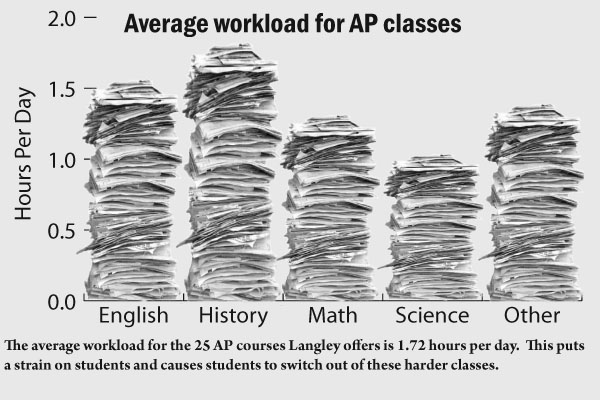When students find themselves in a grueling AP or Honors course that is just too much to handle, they have two options: burden themselves with a year’s worth of overly challenging work or attempt to switch out. Switching out, however, is no walk in the park.
This school year, more than 300 students submitted requests for schedule changes, according to Director of Student Services, Ms. Sonya Williams. Out of those requests, about a quarter of the requests were denied, said Principal Matt Ragone.
“The problem is the number of students who want to switch out of a class, especially if this trend continues,” said Mr. Ragone. Although this is the first year Langley is tracking this data, he says there has “been an upswing” in the number of kids requesting to switch out, particularly from those students in Honors classes.
Once counselors receive a request for schedule change, they have to fill out a portion of the six-page packet online and, if the request is approved by the committee of administrators, go through the master schedule and see if there is any room left for the student. Having to rearrange students’ schedules “is a burden on the counselors and staff who work for several months to create a master schedule to see their hard work gone,” said Ms. Williams.
On the other end, students are pressured with the thought of having a bad grade on their record, and are anxious to switch out of difficult classes.
After the committee of administrators denied his request for a schedule change, senior Andrew Spivey appealed to Mr. Ragone and eventually dropped out of AP Economics. Spivey says, “There was no way for me to be successful in that class.”
Similarly, senior Hunter Bentz dropped Physics this year and approached his schedule change with “an open-mind.”
Mr. Plunkett said “The idea is to make sure kids are placed appropriately. Certain kids know they’re going to take AP and some know they’re going to take regular. It is the middle one third of students trying to decide whether to take AP or not that need to know their expectations.” He added, “Each year the classes get harder. Some kids might not be able to get an A or even a B in an AP or honors course.”
Each year, teachers submit course level recommendations to counselors to evaluate a student’s readiness to take a higher-level course. Although that recommendation isn’t absolute, about 15% of students attempting to switch out of a higher-level class didn’t take the class their teacher recommended them to take, according to Mr. Ragone.
To combat some of these issues, no more schedule change requests will be accepted after Feb. 7 of this year. According to Ms. Williams, the administration is considering when it will start accepting schedule changes for AP and Honors courses next year, specifically whether it will begin doing so after the first or second quarter.
Langley also ran a Curriculum Night on Jan. 18, hoping to “tell parents what is expected of their child. Teachers went over how many tests, quizzes, projects are required for a particular class, the rubrics used for certain essays, and what an ‘A’ assignment looks like,” said Ms. Williams.
Ms. Williams added, “This is all in an effort to help students because they can make better choices.”


